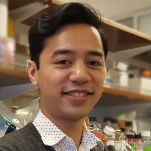Dane received his bachelors in biology at the University of California, San Diego, whereafter he worked as a research technician in the lab of James Wilhelm. In 2011 he entered the Immunology & Microbial Pathogenesis doctoral program at the Weill Cornell Medical College. He works in the lab of Dr. Eric Pamer, whose research focuses on developing novel approaches to treat and to prevent infections by antibiotic-resistant pathogens.
Dane has long understood the power of good, evidence-based policy in raising the standards of living and, in the context of public health, controlling disease in the absence of a cure. Early in his education, a particularly ardent biology teacher made it a point to teach the history of the HIV/AIDS epidemic and the Center for Disease Control's successes and failures in working with the gay and hemophiliac communities to curb the lethality of the disease. This—as well as brushes with different communities facing health issues in disparity—would inform Dane’s integration of his love of biology with his appreciation for public health in his educational pursuits.
Pursuing research to make a difference
Each class and internship thereafter led Dane to apply for Weill Cornell Medical College’s Immunology & Microbial Pathogenesis doctoral program. Basic research focusing on immunology, he reasoned rather simplistically, would be a perfect field with its implications across several disease states and would thereby have a broad impact on several public health problems. Dane would subsequently perform his thesis work in the laboratory of Dr. Eric Pamer, whose research aims to treat antibiotic-resistant pathogens via three arms: the pathogenesis of the bacterium itself, the host microbiota, and the host immune response. Specifically, Dane’s thesis work focused on a specific immune cell type (the inflammatory monocyte) and its involvement in a specific process (antigen transfer) observed during infection by Mycobacterium tuberculosis, the causative agent of the respiratory disease tuberculosis.
Inflammatory monocytes are, as Dane likens them, like emergency first responder cells that mobilize from large pools in the bone marrow and spleen upon injury or infection. Monocytes can subsequently perform a diverse array of functions as needed, but the phenomenon of interest for this project was antigen transfer. By antigen transfer, he means that the monocytes act as middlemen carrying bits of bacteria or whole, live bacteria from inflamed tissues to other myeloid cells in the lymph nodes. The myeloid cells in the lymph nodes then match the bacterial bits to the B and T cells of the adaptive immune system so that the immune system can launch a targeted attack and establish memory for future infections of the same bug.
Bringing science to policy
While rapt in his research and learning about others’ work in the field of immunology, Dane simultaneously became active in community outreach to local students as well as departmental committees. It was through these activities and seeing the problems plaguing the ivory tower itself that he grew interested in science policy as a potential career pathway. And on a chilly November day in 2015, he got reacquainted with classmate who was interested in science education policy. With his classmate, Sarah, and a newfound colleague from Rockefeller University, Avital, Dane would help co-found the Science & Education Policy Association (SEPA), a tri-institutional student and postdoc organization aimed at getting scientists at the three institutes more engaged in science policy.
SEPA provided not only a great platform to explore science policy as a career but also opportunities to work with passionate and highly capable people in their fields. It was a sort of magic-carpet-ride experience for Dane, exposing him to a whole new world of science and its implementation in policy, diplomacy, reform, and advocacy. Aladdin metaphors aside, the timing could not have been more appropriate either, with the growing pseudo- and anti-science rhetoric and thinking plaguing our national dialogue. As Dane hopes SEPA can continue its mission from its nest in the Upper East Side of Manhattan, so does he hope to use his combined experiences and training to promote scientific thinking in the government and the general populace.
